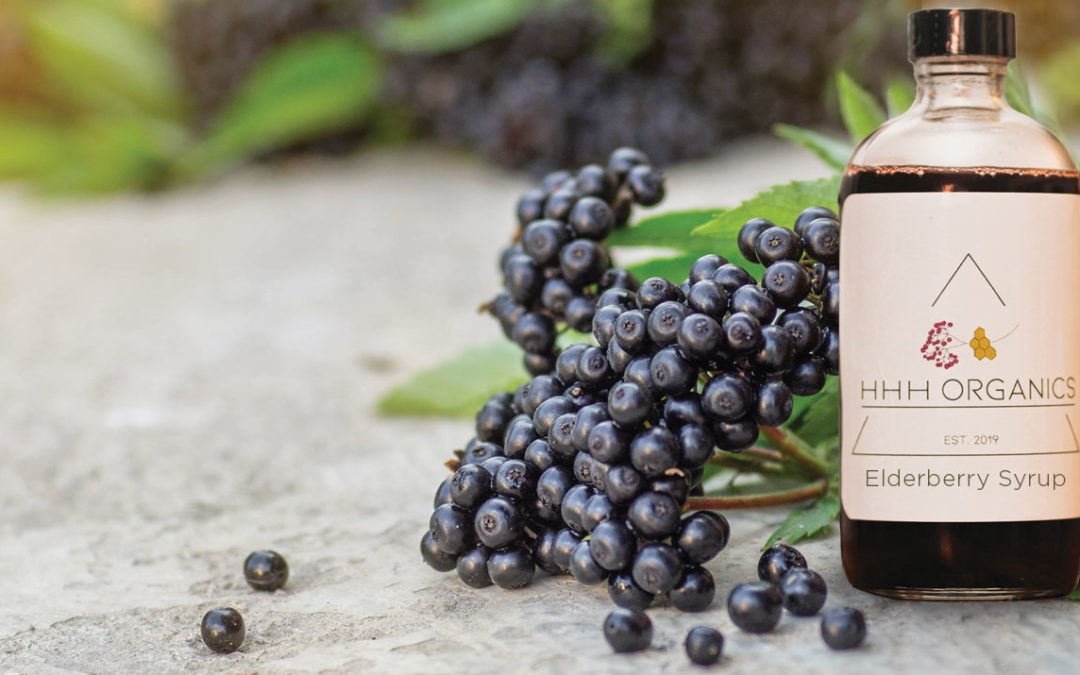As a kid, whenever I felt a cold coming on – scratchy throat, slight soreness, starting to just feel “blah” – my parents first reached for Alka-Seltzer. The small, rectangular package was always weathered and inevitably always 2 years past its expiration date. I was certain we had a magical, expired, bottomless box of Alka-Seltzer in our bathroom closet. Now, as an adult, and capable of my own research, I may have stumbled upon a better option for fighting the icky-ness: Elderberry.
Benefits of using elderberries medicinally go as far back as 400 BC. Elderberries have been used in treating all types of ailments, from headaches and pain relief to stomach problems. If you’re like me, and thinking of putting down the antacid tablets and giving Mother Nature a chance, here are the benefits, and cautions, of using elderberry.
So What is An Elderberry?
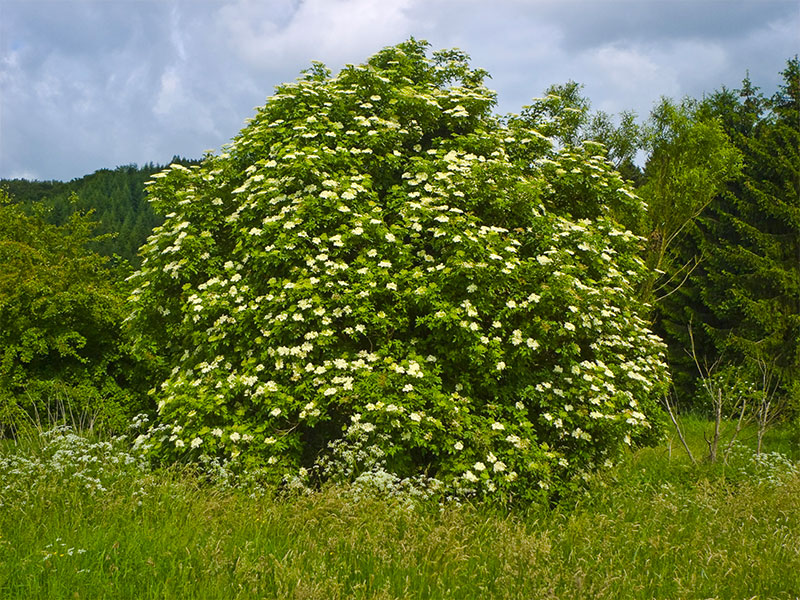
Photo Credit: Willow, CC BY-SA 3.0, via Wikimedia Commons
Looks like a large shrub, doesn’t it? But the European Elderberry (also known as Sambucus nigra) can also be called a tree (If you’re into botany, click here to learn all about the elderberry shrub/tree.
Its white flowers have five stamens (the pollen part) which are borne in late spring to mid-summer. These flowers are pollinated by flies. If you’re grossed out by the idea of flies being pollinators, don’t Google it. Trust me.
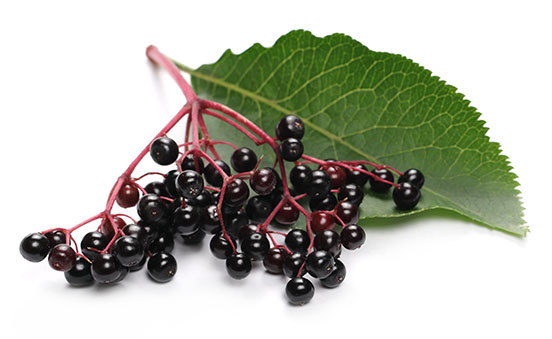
The elderberry fruit is a glossy, dark purple to black berry 3–5 mm in diameter, produced in drooping clusters in late autumn. This is the mighty elderberry fruit that has been used historically for a wide variety of ailments.
The raw berries are tart and need to be cooked to be eaten. Most importantly, they are packed with antioxidants.
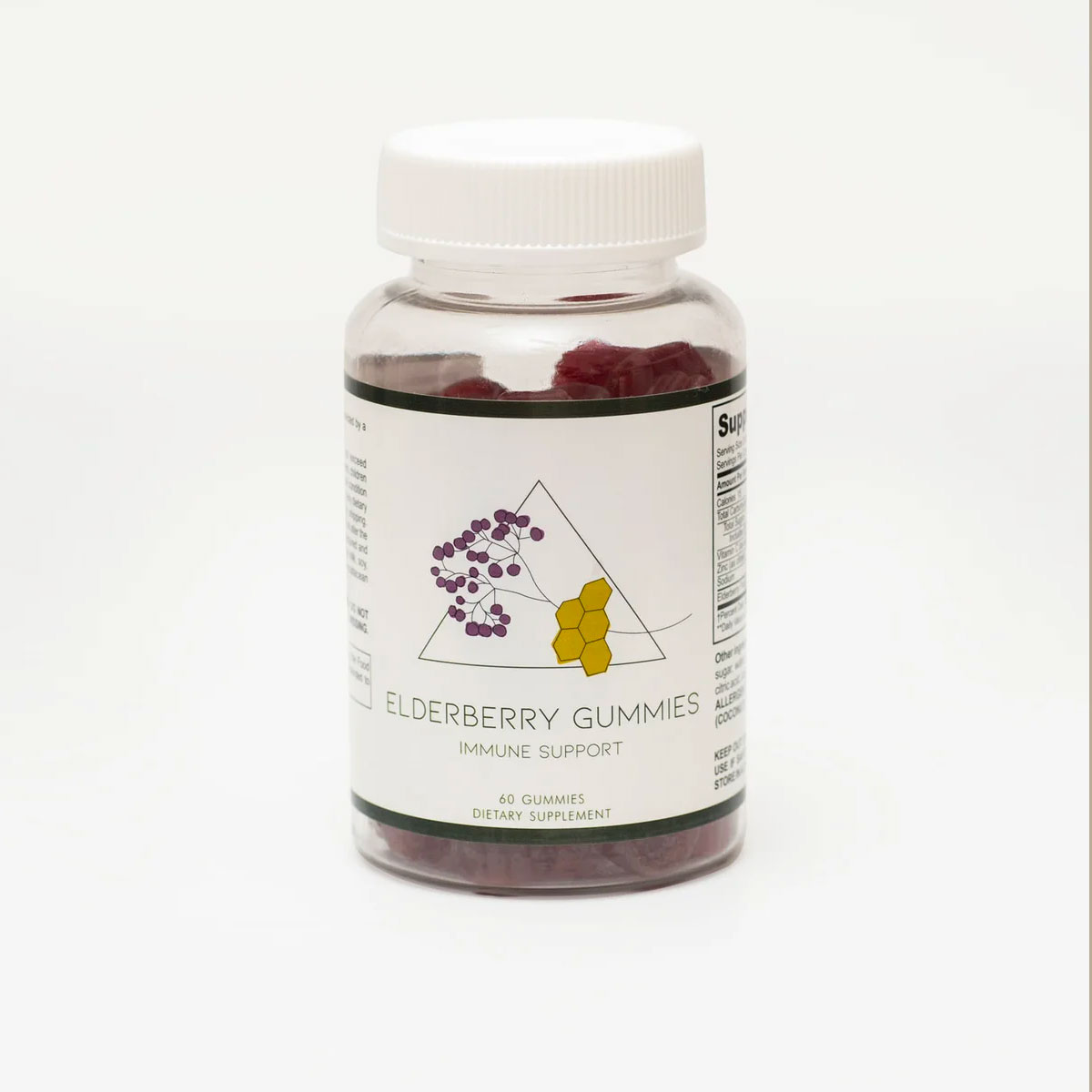
25% OFF Elderberry Gummies
With Coupon Code BOOST
Through November 30, 2022.
Elderberries are:
- High in vitamin C. There are 52 mg of vitamin C per cup of fruit, which accounts for 57% of the daily value
- High in dietary fiber. Elderberries contain 10 grams of fiber per cup of fresh berries, about 36% of the daily value
- A good source of phenolic acids. These compounds are potent antioxidants that can help reduce damage from oxidative stress in the body
- A good source of flavonols. Elderberry contains the antioxidant flavonols quercetin, kaempferol, and isorhamnetin. The flowers contain up to 10 times more flavonols than the berries.
- Rich in anthocyanins. These compounds give the fruit its characteristic dark black-purple color and are a strong antioxidant with anti-inflammatory effects
Benefits of Using The Mighty Elderberry
May Improve Cold and Flu Symptoms
Top of the list of benefits of Elderberry extract is to help reduce the length and severity of symptoms caused by the cold and flu. Important note here. Elderberry does not prevent a cold or flu. But it may be an effective treatment. In fact, a 2004 study of 60 people with influenza found that those who took 15 mL of elderberry syrup four times per day showed symptom improvement in 2 to 4 days, while the control group took 7 to 8 days to improve. Study found here.
Per PharmacyToday, “Antioxidant and antiviral properties are found in elderberry’s high level of flavonoids present in the berries and flowers. Flavonoids enhance production of cytokines, stimulate the immune system, and inhibit red blood cell clumping caused by the influenza virus, thereby preventing adhesion of the virus to cell receptors.”
Because elderberries have a high vitamin A and C content, they are particularly good in the fight against a cold.
There are many other reported benefits of elderberry, though these have limited scientific evidence:
Natural Laxative
Elderberry may give you more than 40% of the daily required fiber in one serving.
Natural Diuretic
People who are having trouble urinating have found elderberry’s natural diuretic properties comforting.
Supports Skin Health
Read the label of your cosmetic product; it may include elderberry.
Lowers Blood Sugar
People with diabetes have benefited from the antioxidants in elderberry because they regulate insulin and glucose levels in the pancreas.
Heart Health
The high fiber levels in elderberry that aid in digestion also seems to have some meaningful heart health benefits.
Reduces Inflammation
Be cautious when purchasing Elderberry Syrups or other products. Buying big name syrup from a chain pharmacy, you may also be getting unwanted preservatives. So if you get elderberry syrup, check the label.
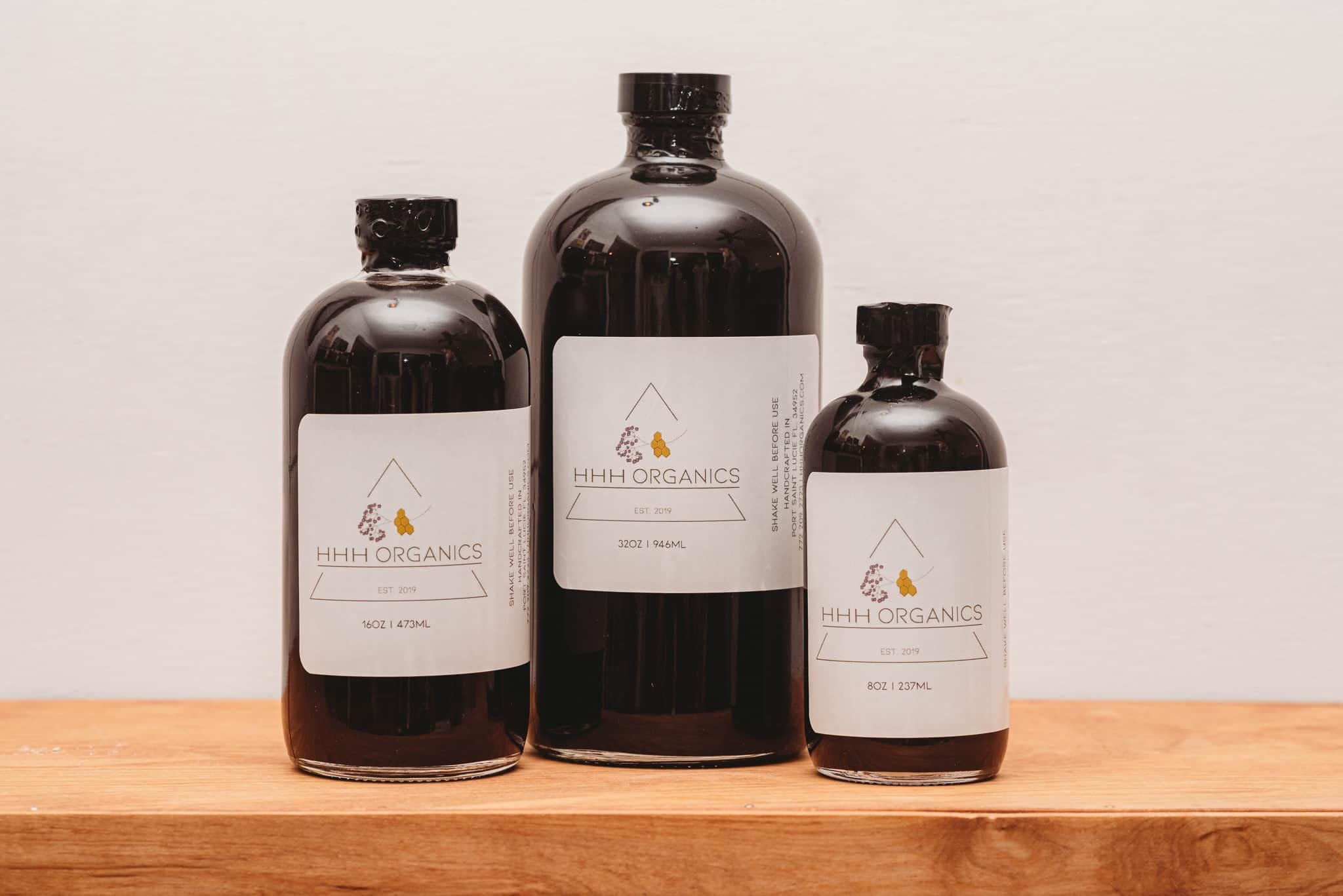
These organic elderberry products from HHH Organics are small batch and only include all-natural premium ingredients. This organic Elderberry Syrup only includes elderberries, aronia berries, hibiscus, astragalus, rose hips, ceylon cinnamon, cloves, ginger root, star anise, local raw honey, arrowroot.
How Much Elderberry Should You Take
When it comes to your health and wellness, always consult with your physician. And keep in mind, elderberry should never be used as a substitute for conventional medical care. If your fever is so high you are hallucinating, seek medical attention. But if you are feeling a little icky, try taking a tablespoon of elderberry syrup 4 times a day to combat the cold, or flu, symptoms.
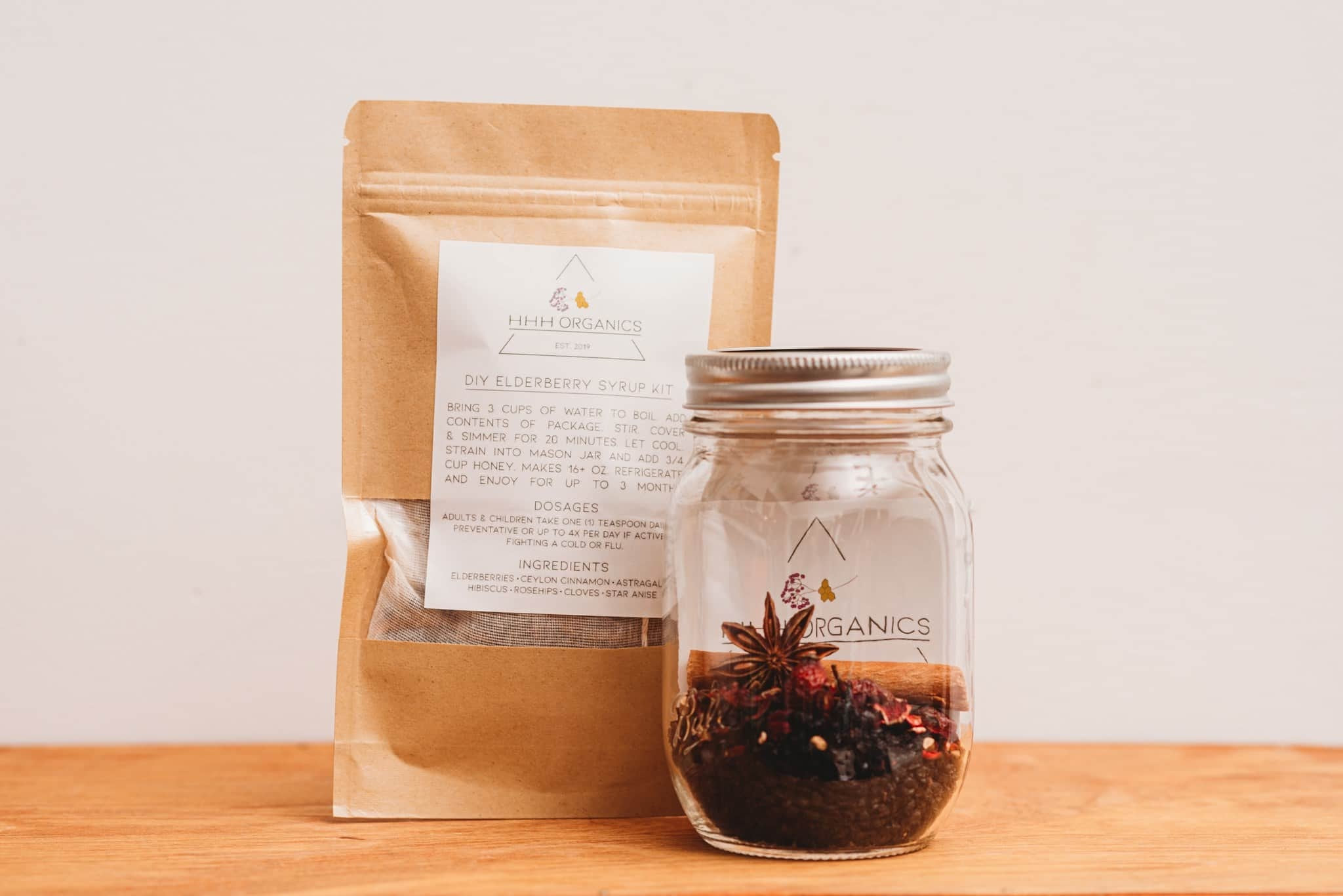
DIY Elderberry Kits
You can make your own Elderberry Syrup. This economical and easy-to-use Brew It Yourself kit makes it simple to keep yourself and your family protected against the yuck all season long. Keep a bottle prepared and in the refrigerator for daily use!
Cautions When It Comes to Elderberry
First, do not eat the raw berries. Elderberries must be cooked before you eat them. The raw berries may make you sick.
Too much elderberry can cause diarrhea and/or stomach aches.
Elderberry is not recommended for pregnant women or nursing mothers.
Elderberry extracts may negatively interact with certain drugs that are designed to suppress the immune system. If you are taking other medicine, get guidance from your healthcare provider.
The Bottom Line
Elderberry has been associated with many promising health benefits. There is some anecdotal evidence that supports its use to help reduce cold and flu symptoms. But keep in mind, the research is not extensive.
NOTE: these statements have not been evaluated by the Food and Drug Administration. Although elderberry is commonly used in dietary supplements and traditional medicine, there is no scientific evidence that it provides any benefit for maintaining health or treating diseases.


